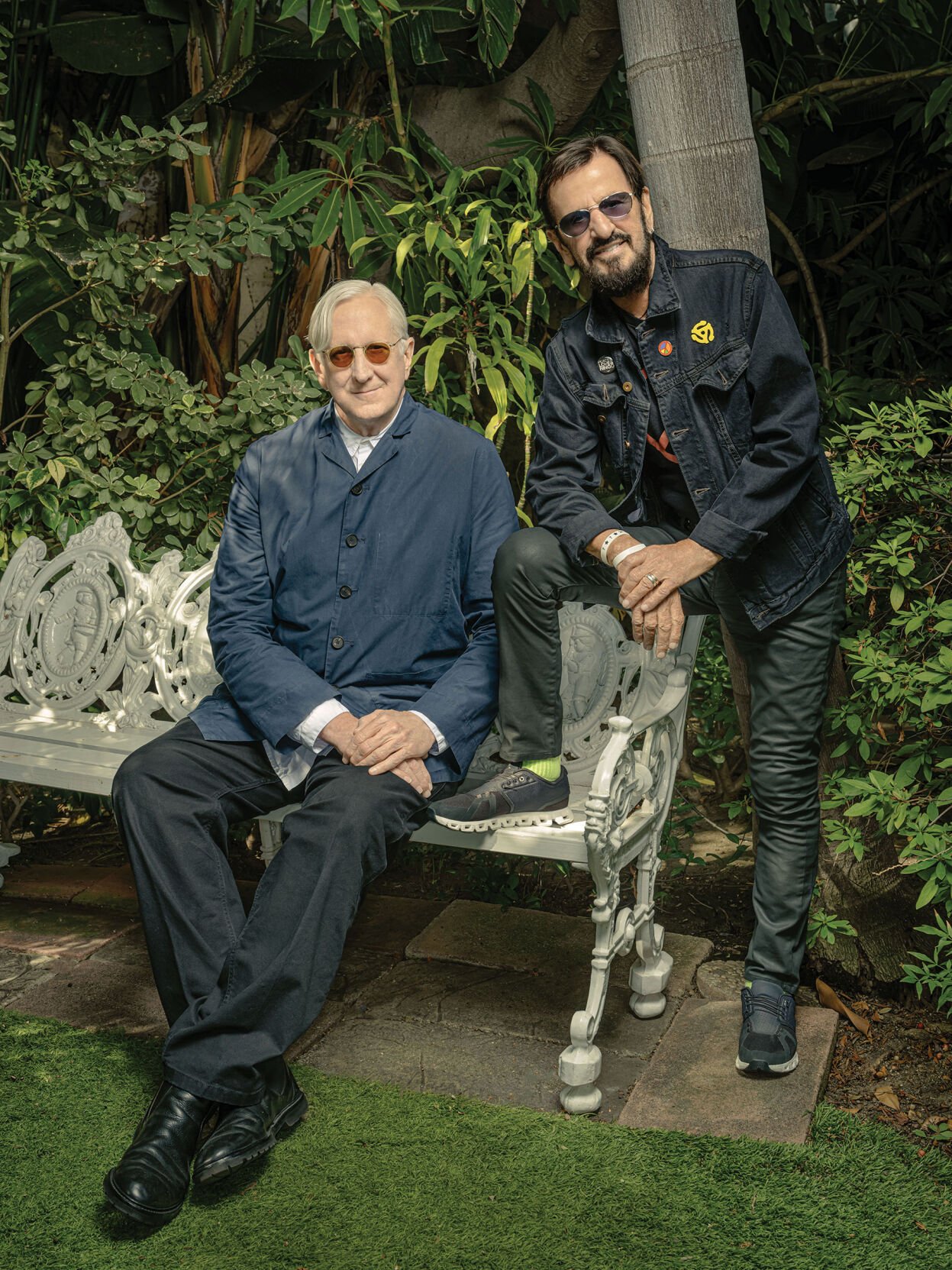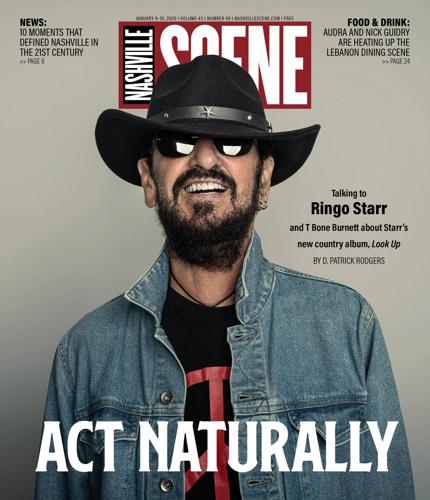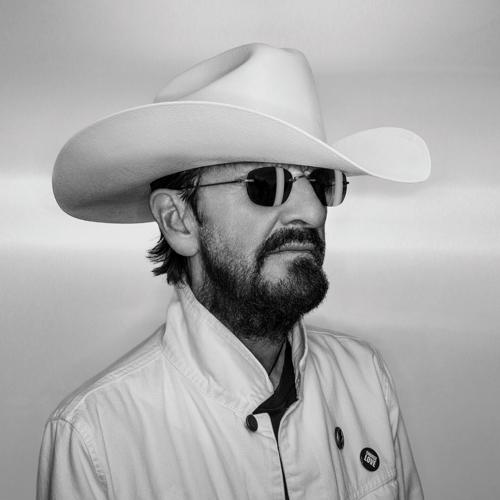“If you find that, get me one,” says Ringo Starr. “I don’t know where mine is anymore.”
Starr is at home in Los Angeles on a November morning, telling the Scene via video call about his misplaced copy of Ernest Tubb’s out-of-print album Midnight Jamboree. The record, released in 1960, features performances from Midnite Jamboree, the WSM radio show launched by Tubb at his Nashville record shop in 1947 and still airing to this day, though it has since changed locations a handful of times. The album, as Starr tells it, was a major influence in turning him on to country music more than 60 years ago.
“He had all these new country people, new guys singing, writing, and he was giving them all a great break, because he put them on this record,” says Starr of Midnight Jamboree, which featured performances by Kitty Wells, Patsy Cline, Webb Pierce and Buddy Emmons, with songs written by Harlan Howard and Marty Robbins, among others. “That was a very important record for me, because it was great, and it was a lot of different styles. It was all country, but it was different. The songs were different.”
The 84-year-old former Beatle is speaking to the Scene from behind dark shades, a peace-symbol pendant dangling from his necklace. He’s in his guest house, or perhaps former guest house — “Now we have no guests, because I’m taking it over,” he says — where he’s tracked his drum and vocal parts on everything he’s recorded over the past 15 years. Starr’s latest effort is Look Up, his first full-length album in six years and first country record in more than a half-century. When asked why a country album, and why now, Starr chalks it up to his willingness to take an unexpected “right turn” when life hands him one.
“Life is good,” he says, “and I’m easy with myself.”
Starr had busied himself during the pandemic by recording and releasing a series of four- and five-song EPs, largely co-produced with his frequent collaborator Bruce Sugar. Then came a chance encounter in 2022 with Nashville-based musician and producer T Bone Burnett. Burnett and Starr were at the famed Chateau Marmont in Los Angeles, where George Harrison’s widow Olivia Harrison was celebrating the release of her book Came the Lightening: Twenty Poems for George. Starr and Burnett had known each other since the mid-’70s, so Starr asked the super-producer if he’d like to send him a song.
“I was in the middle of doing sort of a pop-rock EP, and he sent this track, and it was the most beautiful country track I’d heard in a long time,” says Starr. “So far-out. And so then I made a right turn. I thought, ‘Hey, maybe I’ll do a country EP.’ … So anyway, we’re hanging around in this room, and we’re talking about songs, and I said, ‘Well, how many songs have you got anyway?’ And he said, ‘Well, I got nine,’ and he had them in his pocket.”
“I didn’t know if he would like any of the songs or not, so I just kept writing until there were nine songs, and then he liked all of them,” Burnett tells the Scene. “He said, ‘Well, let’s just do an album then.’ And I said, ‘Great, let’s do it, let’s go.’ He said, ‘Will you produce it?’ And I said, ‘Yes, enthusiastically yes, I will.’”
The result is an 11-track album featuring the talents of an array of relative newcomers and established writers and performers alike, many of whom live in or have direct connections to Nashville. There are tracks written or co-written by Starr, Burnett and Sugar, as well as legendary singer-songwriters Billy Swan and Paul Kennerly. Nashvillian Daniel Tashian co-produced, performed on and co-wrote several songs, while breakout bluegrass stars Billy Strings and Molly Tuttle provided guitars and harmony vocals on several tracks each, and pop duos Lucius and Larkin Poe both appear on a track apiece. Regular Burnett collaborator Alison Krauss contributed harmony vocals on album closer “Thankful.”
It’s a vibrant, lush album of what Burnett refers to as “American music,” splitting the difference between classic country and a more contemporary pop-rock sound. It’s out this Friday via UMG Nashville imprint Lost Highway Records, and next week, Starr and his band will appear at the Mother Church of Country Music in support of the record.

T Bone Burnett and Ringo Starr
Conversing with T Bone Burnett is a bit like talking to an American music historian, not unlike a member of the famed Lomax family of archivists, though he might balk at that description. Talking to the Scene by video call from his home in Nashville — his primary residence since the pandemic — Burnett brushes his trademark swoop of silver hair back across his forehead as he leans forward to speak.
“When I think of Ringo, I think of rockabilly music, mostly,” says Burnett. “All of his stuff — ‘Honey Don’t,’ ‘Matchbox,’ ‘Act Naturally,’ ‘What Goes On,’ ‘Don’t Pass Me By,’ even ‘Octopus’s Garden’ — were all country songs. Also I knew that when he was 16 he wrote to the Houston Chamber of Commerce to find out where [legendary country-blues performer] Lightnin’ Hopkins lived, because he wanted to move near Lightnin’ Hopkins. And also the name Ringo Starr sounds like the sheriff of Dodge City, Kan., you know. It’s a cowboy name, so I wrote him a cowboy song. I wrote what I thought of as a Gene Autry song.”
That first song is “Come Back,” which is also included on Burnett’s 2024 solo album The Other Side. Starr’s version is the only song on Look Up that doesn’t feature Starr’s drumming — though it does feature his surprisingly lithe whistling, as well as rich, gorgeous vocal harmonies by Lucius’ Jess Wolfe and Holly Laessig.
With 13 Grammy wins out of 20 total nominations, Burnett has a storied career that has included collaborations with Bob Dylan, Delbert McClinton, Roy Orbison, Brandi Carlile, B.B. King, Elton John, Leon Russell, Gregg Allman, Ralph Stanley and Gillian Welch, among countless others. He also produced the music for the films O Brother, Where Art Thou?, Cold Mountain, Walk the Line and Crazy Heart — winning a Best Original Song Oscar for the latter’s “The Weary Kind” — and television shows like ABC’s Nashville, which was created by his wife Callie Khouri. But as with many performers, Burnett’s output slowed with the onset of the COVID-19 pandemic.
Until 2024, that is, a year that ultimately proved to be Burnett’s most productive in recent memory. In addition to Look Up and his own The Other Side, the producer and guitarist also collaborated with his friend Elvis Costello on their long-simmering project The Coward Brothers.
“I took a few years off during the ‘emergency,’ as Elvis calls it, and I think running into Ringo at the Chateau Marmont kicked off this whole spate of songs,” he says. “I mean, I wrote 12 songs or something for myself on The Other Side. During the pandemic, [Costello and I] wrote that whole Coward Brothers thing. … But then, when the Ringo thing happened, I’ve written probably 40 or 50 songs since he asked me to write him the song.”
The tracking process for Look Up was split between Nashville and L.A. Burnett and bassist Dennis Crouch — “about as solid and groovy a bass player as has ever lived,” the producer says — would lay down the foundation of each song at Burnett’s studio in Nashville’s Germantown neighborhood. They then sent the tracks to Starr, and Burnett traveled to Los Angeles to track drums and vocals in Starr’s guest house.
“He’d do two takes, and he never did more than two takes, and he never planned anything,” says Burnett. “And always when he started, I thought, ‘Wow, where is this going? What’s he doing?’ … But by the time he got to the end, I thought, ‘Oh, of course.’ Like with the song ‘Breathless,’ you know. In the first two verses, he plays a fill after the third line of the verse. Nobody’s ever done that in history.”
“All my life [people have said], ‘Oh, play that fill again,’” says Starr of his drumming. “I cannot play a fill twice. I can’t do the same fill because I come off in an emotional moment, you know? So I’m usually [right on] the next take, unless we’ve got something worked out. Otherwise, I’ll just wing it because I feel it.”
“There’s no real sense in how I play,” he says with a laugh. “But the no sense is great.”
But there is some sense to it. Starr notes that the visceral emotion he felt in the early country songs of performers like Lightnin’ Hopkins — songs he characterizes as “She’s left, the dog’s dead, I got no money for the jukebox, things are rough” — is something he tries to capture in his two-take drumming. Like with the uptempo shuffle of album opener “Breathless,” which features what Burnett ultimately describes as his favorite drumming on the record — Starr’s flourishes don’t land at the start of a chorus or a bridge, where most drummers would put a bit of flash. Instead, Starr’s parts rise and fall with the lyrics, or with the track’s acoustic guitar solo, played nimbly by the famously swift-fingered Billy Strings.
“I had always been curious about [Burnett’s] process in the studio, and I was a little nervous when I went in about playing well and doing a good job,” says Tuttle, who describes her experience playing on Look Up as both “the honor of a lifetime” and “absolutely surreal.” The vocalist, guitarist and mandolinist contributed to four songs, including the title track and album standout “I Live for Your Love.”
“At one point T Bone talked about how he makes records in a fluid way that changes to fit each project,” says Tuttle. “For this record we were laying down parts remotely over Ringo’s drum and vocal tracks, which worked well because it gave a lot of room to experiment with different instrumentation and ideas but kept the arrangements centered on Ringo’s playing and singing.”
Though the album is imbued with the technical prowess of Tuttle, Strings, Tashian, Crouch and all the rest, its defining feature is its confident emotional range rather than the skill of its players.
“I’m working with five people right now all over 80 years old,” says Burnett. “Willie Nelson, Bob Dylan, Twyla Tharp, Meredith Monk and Ringo Starr. And the thing I can say about working with people over 80 is it’s all second nature. There’s no insecurity, there’s no doubt, there’s no fear of the future. We’ve all got a great future behind us, and that’s how it is. I mean, I think Ringo has probably always been that way. I think he’s a very instinctive player, instinctual player.”

The path that led Starr from his early years listening to country music recorded at Ernest Tubb Record Shop to playing songs from his new country album at the Ryman — which is just a few hundred feet away from the former Tubb Records building on Lower Broad — has been anything but a straight one.
As Starr tells it, in The Beatles’ earliest days, the band was being influenced by a swirl of American music, from Johnny Cash and Waylon Jennings to Buddy Holly, Gene Vincent and any Motown albums they could get their hands on.
“We did some country songs, The Beatles, and we did Motown songs,” says Starr. “Because, in all honesty, at the beginning, we were like every band in Liverpool. We were a cover band. So one night, I went to a gig, and there were three bands on, and the other two drummers didn’t make it, and I just played with the three bands. The curtains closed, and there’s another band, and I’m still there, curtains close, I’m still there — because we were all playing, really, the same songs.”
“The Beatles are very much an American music band,” says Burnett. “Even though they were from England, they didn’t give up on our music. When they came out, the charts were Frankie Avalon and very, very safe things, Pat Boone and those sorts of things. So we’re all beneficiaries of [what The Beatles did]. Billy Strings is a beneficiary of that. Molly Tuttle’s a beneficiary. All of us are. The first country-rock song of all was [The Beatles’] ‘I Don’t Want to Spoil the Party.’ You know, you could say that every country act today goes back to that song.”
As noted by Burnett, many of the 11 Beatles songs featuring Starr on lead vocals are what you could call country music, or at least rockabilly — be they originals like “What Goes On” and “Don’t Pass Me By” or covers like Carl Perkins’ “Honey Don’t” and “Matchbox” and Buck Owens’ “Act Naturally.” But Starr’s second solo album, Beaucoups of Blues — produced by legendary pedal-steel player Pete Drake over a whirlwind three days in Nashville just months after The Beatles’ dissolution — was the drummer’s last serious foray into making country music for many decades.
The Beatles drummer was honored ahead of Sunday's gig at the Ryman
In the roughly 54 years since releasing Beaucoups of Blues, Starr has issued dozens of albums both as a solo artist and with his supergroup the All-Starr Band. Though Starr did team up with Owens in 1989 to revisit “Act Naturally” as a duet, the majority of his output since Beaucoups has been rock and pop music. But country music is in Starr’s musical DNA, and as an artist who’s always been willing to make an unexpected “right turn,” he followed his muse when the opportunity to make a country record presented itself.
And one Look Up song in particular speaks to Starr’s lifelong musical journey.
“I love the song ‘I Live for Your Love,’ and Ringo really loves that song,” says Burnett of the album’s fifth track, which features rich swaths of pedal steel performed by prolific sideman Paul Franklin. “Billy Swan wrote the verse — ‘I don’t live for the future, I don’t live for the past.’ … I think those two lines are really important to Ringo, because I think there’s this temptation when you have as profound a past as he does, there’s always some kind of pull back to it. I don’t think he resisted exactly, but I think he wants to live very much in the present. He’s got a full life. You know, The Beatles were maybe five years of his life when he was a kid, and it’s colored everything else he’s done. So that song’s really — I find it touching. I find his version of it very touching. I think Molly’s singing on it is beautiful. Her playing — she’s playing all that acoustic guitar stuff on it — I think her playing is really beautiful on it.”
Next week, Ringo Starr & Friends will play two nights at the Ryman in support of Look Up. Co-produced by Starr, Burnett and Van Toffler, the Jan. 14 and 15 shows will be filmed for a special and will feature performances of many Look Up songs and — according to Starr — “‘Octopus’s Garden’ in a country style.”
Starr has of course played the Ryman on a number of occasions, including as recently as September 2023, shortly after being inducted into Nashville’s Musicians Hall of Fame. But the sanctity of the venue is something he’s never taken for granted.
“To me, to be on that stage that was like the place all of the big shots of the ’50s and ’60s were playing — that was the country music I came in with,” says Starr. “And so every time I’ve played there I had this moment: ‘Wow, I’m at the Ryman.’”





